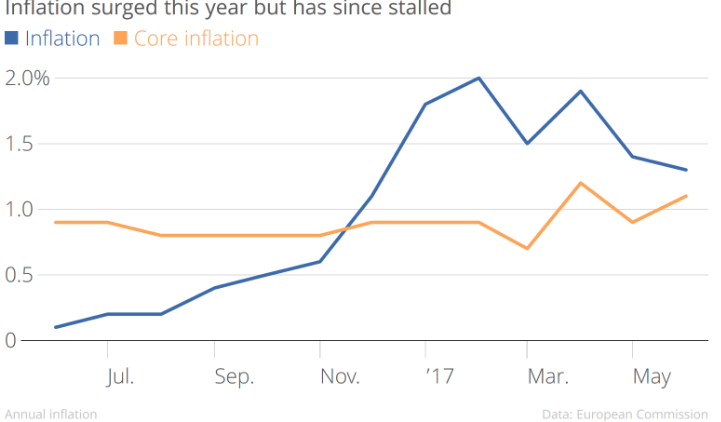Eurozone inflation fell in June, the European Commission today confirmed, easing pressure on the European Central Bank (ECB) to start tightening monetary policy at its next announcement on Thursday.
Consumer prices rose just 1.3 per cent in June, down from 1.4 per cent in May.
Meanwhile, core inflation, which strips out the effects of volatile energy and food costs, rose by 1.1 per cent, below its April high of 1.2 per cent.
The stubborn refusal of inflationary pressure to pick up towards the ECB’s two per cent target, despite the continued fall in unemployment in the Eurozone, has made the central bank wary of raising tightening conditions either by stopping quantitative easing (QE) or raising its key interest rates.
Speculation has mounted since the ECB’s last meeting in June that the central bank might be readying markets for tighter policy at its 12:45pm announcement on Thursday.
Time is running out for the ECB to announce the next stage of its QE asset purchase programme, which is currently set to expire in December. It is currently buying around €60bn in bonds each month in an effort to push money out into the broader economy and stimulate growth, with more purchases at a slower rate expected by most economists.
Despite saying deflationary pressures had finally been banished from the Eurozone after a sustained period of negligible price growth, ECB president Mario Draghi has been at pains in recent weeks to emphasise policy will remain accommodative.
At the beginning of the year Draghi had come under sustained pressure to tighten policy sooner rather than later, given a surge in inflation to the two per cent target in February. However, inflation has since moderated to 1.5 per cent in Germany in June, and only 0.8 per cent in France.
Draghi is also keen to avoid triggering a sell-off in Eurozone government debt akin to 2013’s so-called taper tantrum, when the tapering of QE by the Federal Reserve caused panic on global bond markets. Recent hawkish comments from Draghi and other bankers have seen German 10-year bond yields hover around levels not seen since early 2016, breaking through the 0.5 per cent barrier.
Anatoli Annenkov, an economist at Societe Generale, said: “Striking a balance between the weak inflation outlook, above-potential growth and the credibility of instruments remains a major communication challenge for the ECB, with ample room for ambiguity affecting markets.”
Economists at JP Morgan believe the ECB is “likely to signal a tapering decision in September”, with the possibility of “an opening statement that removes the ‘easing bias’ on QE or points to upcoming forecasts as a guide to assessing asset purchases beyond this year”.
Report courtesy Cityam








